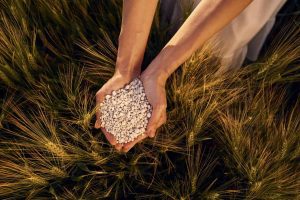Amazing Perlite Substance

Perlite: A Sustainable Solution for Agriculture and Horticulture
Perlite substance is a popular amendment used in agriculture and horticulture to improve soil structure, drainage, and aeration. Perlite is volcanic mineral that is mined and then heated at high temperatures to expand it into lightweight, porous particles.
In horticulture, perlite is commonly used as a soil amendment to improve soil structure and drainage. Perlite is particularly useful in heavy, clay soils that are prone to compaction and poor drainage. When added to these soils, perlite helps to create air pockets and improve the soil’s water-holding capacity. which can help plants grow better.
Perlite is also used as a growing medium for potted plants and hydroponic systems. As a growing medium, perlite provides excellent drainage and aeration, which helps to prevent water logging and root rot. Perlite is also sterile and free from pests and diseases. making it an ideal choice for starting seeds and rooting cuttings.
In addition to its use as a soil amendment and growing medium, perlite is also used in horticulture. As a carrier for fertilizers and pesticides. Because of its porous nature, perlite can absorb and hold onto nutrients and chemicals. Allowing them to be slowly released to plants over time.
Overall, perlite is a versatile and valuable tool for improving soil structure, drainage, and aeration in agriculture and horticulture.
How does perlite compare to other soil amendments?
Perlite has several advantages over other soil amendments. which make it a popular choice among gardeners and farmers.
- Lightweight: Perlite is very lightweight, which makes it easy to handle and mix into soil. It also doesn’t add significant weight to potted plants, which can be important for indoor and balcony gardening.
- Porous: Perlite is highly porous. which means it can hold onto water and nutrients while still allowing air to circulate through the soil. This makes it an excellent choice for improving drainage in heavy, clay soils.
- Sterile: Perlite is sterile and free from pests and diseases. which makes it safer to use than other organic soil amendments that can harbor harmful bacteria or fungi.
- pH-neutral: Perlite is pH-neutral, which means it won’t affect the pH of the soil it’s mixed into. This is in contrast to other soil amendments like lime or sulfur, which are used to adjust soil pH.
- Long-lasting: Perlite doesn’t break down or decompose over time. which means it can provide long-lasting benefits to soil structure and drainage.
Compared to other soil amendments like vermiculite, sand, or peat moss, perlite’s lightweight, porous, and sterile. make it an attractive choice for improving soil structure and drainage in agriculture and horticulture. However, the best soil amendment for a particular situation depends on factors like soil type, plant species, and drainage requirements.
Can perlite substance be used in organic farming?
Perlite is allowed for use in organic farming. but its use must comply with the standards set by organic certification organizations. In the United States, the National Organic Program (NOP) regulates the use of perlite substance in organic farming.
Perlite itself is a naturally occurring mineral and is not prohibited for use in organic farming. However, it’s important to ensure that perlite used in organic farming hasn’t been treated with any synthetic chemicals or substances. which are prohibited under organic certification standards.
Organic certification standards require that all inputs used in organic farming, including soil amendments like perlite, be evaluated. In order to ensure they are consistent with organic principles and practices. Organic farmers must keep records of all materials used on their farms. And must be able to demonstrate that they are following organic standards.
In summary, perlite substance can be used in organic farming. As long as the specific product used is compliant with organic certification standards and doesn’t contain any prohibited synthetic substances. Organic farmers should always consult with their certifying agency. In order to ensure that any inputs they use are allowed under organic certification standards.

Important points for working with perlite substance in agriculture
here are some important points for working with perlite in horticulture.
- Use high-quality perlite that is free from contaminants, such as heavy metals or pathogens. It is important to ensure that the perlite you use meets the standards set by your local regulatory agencies.
- Perlite substance is a lightweight material that can blow away easily in windy conditions. To prevent the loss of perlite, it is important to cover it with a layer of soil or mulch.
- Perlite should be incorporated into soil mixes at a rate of 10-20% by volume. This will help to improve soil structure, drainage, and aeration.
- Perlite can be used as a stand-alone growing medium for hydroponic systems or as a component of soilless mixes. When using perlite as a growing medium, it is important to ensure that it is adequately moistened. And that plants receive appropriate nutrient inputs.
- Perlite does not provide significant amounts of nutrients to plants. so it should be used in conjunction with other soil amendments and fertilizers. In order to provide plants with all of the necessary nutrients they need.
- Perlite can be reused multiple times, but it should be sterilized between uses to prevent the spread of pathogens.
- When handling perlite, it is important to wear appropriate personal protective equipment (PPE). Including gloves, eye protection, and a dust mask, to avoid inhalation of dust.
By following these important points, you can ensure safe and effective use of perlite in agriculture.
